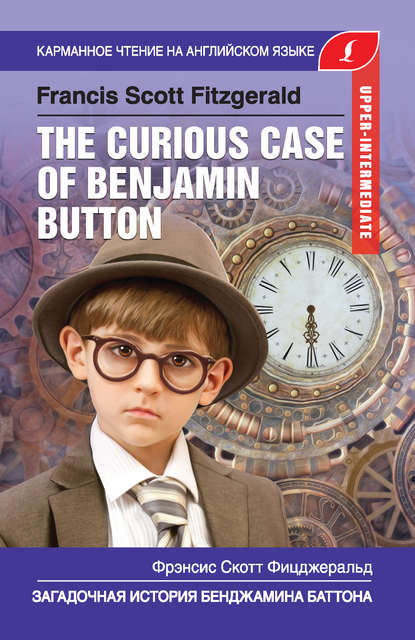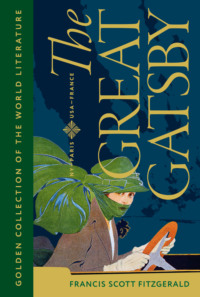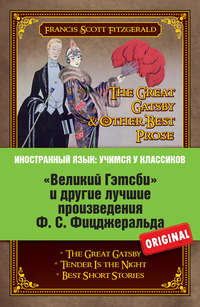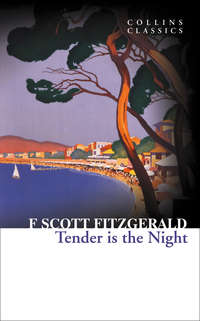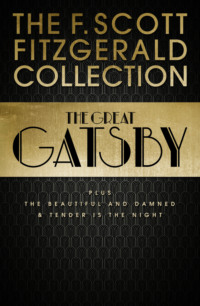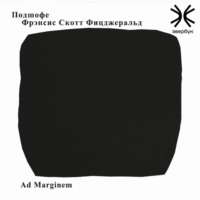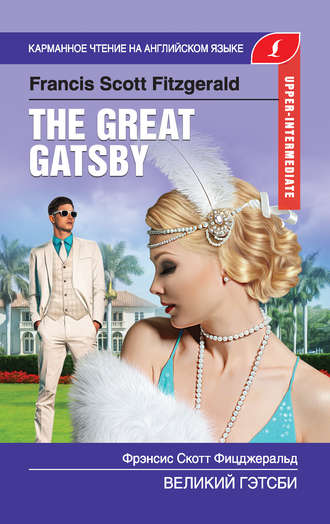
Полная версия
Великий Гэтсби / The Great Gatsby

Фрэнсис Скотт Фицджеральд / F. Scott Fitzgerald
Великий Гэтсби / The Great Gatsby
Адаптация текста и словарь C.А. Матвеева
© Матвеев С.А., адаптация текста, словарь
© ООО «Издательство АСТ», 2019
Chapter 1
In my younger years my father gave me some advice. “Whenever you feel like criticizing anyone,” he told me, “just remember that all the people in this world haven’t had the advantages that you’ve had.”
He didn’t say any more but I understood that he meant a great deal more than that. A habit to reserve all judgments has opened up many curious natures to me. In college I was privy to the secret grief’s of wild, unknown men.
When I came back from the East last autumn I felt that I wanted the world to be in uniform. I wanted no more riotous excursions with privileged glimpses into the human heart. Only Gatsby, the man who gives his name to this book, was exempt from my reaction—Gatsby who representedeverything for which I have an unaffected scorn[1].
There was something gorgeous about him, some heightened sensitivity to the promises of life, as if he were related to one of those intricate machines that register earthquakes ten thousand miles away. It was an extraordinary gift for hope, a romantic readiness such as I have never found in any other person.
My family has been prominent, well-to-do people for three generations. The Carraways are something of a clan and we have a tradition that we’re descended from the Dukes of Buccleuch, but the actual founder of my line was my grandfather’s brother who came here in fifty-one and started the wholesale hardware business that my father carries on today. I never saw this great-uncle but I look like him—I saw a painting that hangs in father’s office.
I graduated fromNew Haven[2] in 1915, just a quarter of a century after my father, and a little later I participated in the Great War. Then I decided to go East and learn the bond business[3]. Father agreed to finance me for a year and after various delays I came East, permanently, I thought, in the spring of twenty-two[4].
The practical thing was to find rooms in the city but it was a warm season, so when a young man at the office suggested that we take a house together it sounded like a great idea. He found the house, a cardboard bungalow at eighty a month. I had an old Dodge and a Finnish woman who made my bed and cooked breakfast, and muttered Finnish words to herself over the electric stove.
One morning some man stopped me on the road.
“How do you get to West Egg village?” he asked helplessly.
I told him. I was a guide, a pathfinder, an original settler. The life was beginning over again with the summer.
There was so much to read. I bought a dozen volumes on banking and credit and investment securities and they stood on my shelf in red and gold.
I lived at West Egg. I rented a house in one of the strangest communities in North America. It was on that slender riotous island which extends itself due east of New York. My house was between two huge places that rented for twelve or fifteen thousand a season. The one on my right was Gatsby’s mansion.
Across the bay the white palaces of fashionable East Egg glittered along the water, and the history of the summer really begins on the evening I drove over there to have dinner with the Buchanans. Daisy was my second cousin. Her husband’s name was Tom. I’d known Tom in college. And just after the war I spent two days with them in Chicago.
Tom’s family was enormously wealthy—even in college his freedom with moneywas a matter for reproach[5]. Why they came East I don’t know. This was a permanent move, said Daisy over the telephone, but I didn’t believe it. They had spent a year in France, for no particular reason, and then drifted here and there, wherever people played polo and were rich together.
And so it happened that on a warm windy evening I drove over to East Egg to see two old friends whom I scarcely knew at all. Their house was even more elaborate than I expected. The lawn started at the beach and ran toward the front door for a quarter of a mile. The front was broken by a line of French windows, glowing now with reflected gold, and wide open to the warm windy afternoon, and Tom Buchanan in riding clothes was standing on the front porch.
Tom had changed since his New Haven years. Now he was a sturdy straw haired man of thirty with a rather hard mouth and a supercilious manner.
He could not hide the enormous power of his body. It was a body capable of enormous leverage—a cruel body.
His voice was a gruff husky tenor. “Now, don’t think my opinion on these matters is final,” he seemed to say, “just because I’m stronger and more of a man than you are.” We were in the sameSenior Society[6], and while we were never intimate I always had the impression that he wanted me to like him.
We talked for a few minutes on the sunny porch.
“I’ve got a nice place here,” he said. He turned me around, politely and abruptly. “We’ll go inside.”
We walked through a high hallway into a bright rosy-colored space. The windows were ajar and gleaming. A breeze blew through the room, blew curtains in at one end and out the other like pale flags.
The only completely stationary object in the room was an enormous couch on which two young women were lying. They were both in white. I stood for a few moments listening to the whip and snap of the curtains and the groan of a picture on the wall.
Tom Buchanan shut the rear windows and the caught wind died out about the room. The younger of the two was a stranger to me. She was completely motionless and with her chin raised a little.
The other girl, Daisy, made an attempt to rise. She leaned slightly forward—then she laughed, an absurd, charming little laugh, and I laughed too and came forward into the room.
“I’m p-paralyzed with happiness.”
She laughed again, and held my hand for a moment, looking up into my face.
She murmured that the surname of the other girl was Baker. Miss Baker’s lips fluttered, she nodded at me and then quickly tipped her head back again.
I looked back at my cousin who began to ask me questions in her low, thrilling voice. Her face was sad and lovely with bright things in it, bright eyes and a bright passionate mouth.
I told her how I had visited in Chicago some friends and how a dozen people had sent her their love.
“Do they miss me?” she cried.
“The whole town is desolate. All the automobiles are painted black and there’s a persistent wail all night.”
“How gorgeous! Let’s go back, Tom. Tomorrow!” Then she added irrelevantly: “You must see the baby.”
“I’d like to.”
“She’s asleep. She’s two years old. Haven’t you ever seen her?”
“Never.”
“Well, you must see her. She’s…”
Tom Buchanan rested his hand on my shoulder.
“What do you do, Nick?”
“I’m a bond man[7].”
“Who with?”
I told him.
“Never heard of them,” he remarked decisively.
This annoyed me.
“You will,” I answered shortly. “You will if you stay in the East.”
“Oh, I’ll stay in the East, don’t you worry,” he said, glancing at Daisy and then back at me.
At this point Miss Baker said “Absolutely!” It was the first word she uttered since I came into the room. It surprised her as much as it did me. She yawned and with a series of rapid, deft movements stood up into the room.
“You see,” Daisy told Miss Baker. “I’ve been trying to get you to New York all afternoon.”
I looked at Miss Baker, I enjoyed looking at her. She was a slender girl,with an erect carriage[8]. Her grey sun-strained eyes looked back at me. It occurred to me now that I had seen her, or a picture of her, somewhere before.
“You live in West Egg,” she remarked contemptuously. “I know somebody there.”
“I don’t know a single—”
“You must know Gatsby.”
“Gatsby?” demanded Daisy. “What Gatsby?”
Before I could reply that he was my neighbour dinner was announced. Tom Buchanan took me from the room. We went out.
The two young women preceded us toward the sunset where four candles flickered on the table.
“Why candles?” objected Daisy, frowning. She snapped them out with her fingers. “In two weeks it’ll be the longest day in the year.”
She looked at us all radiantly.
“Do you always watch for the longest day of the year and then miss it? I always watch for the longest day in the year and then miss it.”
“Let’s plan something,” yawned Miss Baker, sitting down at the table.
“All right,” said Daisy. “What’ll we plan?” She turned to me helplessly. “What do people plan?”
Before I could answer Daisy showed her little finger.
“Look!” she complained. “I hurt it.”
We all looked—the finger was black and blue.
“You did it, Tom,” she said. “I know you didn’t mean to but you DID do it. Why did I marry such a man!”
She and Miss Baker accepted Tom and me, making only a polite pleasant effort to entertain or to be entertained.
“I feel uncivilized with you, Daisy,” I said.
“Civilization’s going to pieces,” said Tom violently. “If we don’t look out the white race will be submerged. It’s all scientific stuff; it’s been proved.”
“Tom is becoming a wise man,” said Daisy with an expression of sadness. “He reads clever books with long words in them. What was that word…”
“Well, these books are all scientific,” insisted Tom, glancing at her impatiently. “We, the dominant race, must watch out or these other races will have control of things.”
“If you lived in California—” began Miss Baker but Tom interrupted her.
“This idea is that we—I, you, and you—we’ve produced all the things that go to make civilization—oh, science and art and all that. Do you see?”
There was something pathetic in his words. Suddenly the telephone rang and Tom left.
Daisy leaned toward me.
“I love to see you at my table, Nick. You remind me of a—of a rose, an absolute rose. Doesn’t he?” She turned to Miss Baker for confirmation: “An absolute rose?”
This was untrue. I am not even faintly like a rose. Then she threw her napkin on the table and excused herself and went into the house.
Miss Baker and I exchanged a short glance devoid of meaning.
“This Mr. Gatsby you spoke of is my neighbor,” I said.
“Don’t talk. I want to hear what happens.”
“Is something happening?” I inquired innocently.
“Don’t you know?” said Miss Baker, honestly surprised. “I thought everybody knew.”
“I don’t.”
“Tom’s got some woman in New York,” said Miss Baker.
“Got some woman?” I repeated.
Miss Baker nodded.
“She might have the decency not to telephone him at dinner-time. Don’t you think?”
Tom and Daisy were back at the table.
Daisy sat down, glanced searchingly at Miss Baker and then at me and said: “I looked outdoors for a minute and it’s very romantic outdoors. There’s a bird on the lawn, I think, a nightingale. He’s singing so sweetly! It’s romantic, isn’t it, Tom?”
“Very romantic,” he said, and then to me: “After dinner I want to show you my horses.”
The telephone rang inside, and Daisy shook her head decisively. The horses, needless to say, were not mentioned again. Tom and Miss Baker went into the library, while I followed Daisy around the house. Then we sat down side by side on a bench.
Daisy took her face in her hands.
“We don’t know each other very well, Nick,” said Daisy. “Even if we are cousins. You didn’t come to my wedding.”
“I wasn’t back from the war.”
“That’s true.” She hesitated. “Well, I’ve had a very bad time, and I’m pretty cynical about everything.”
I waited but she didn’t say any more, and after a moment I decided to talk about her daughter.
“I suppose she talks, and—eats, and everything.”
“Oh, yes.” She looked at me absently. “Listen, Nick; let me tell you what I said when she was born. Would you like to hear?”
“Very much.”
“Well, she was less than an hour old and Tom was God knows where. I woke up and asked the nurse right away if it was a boy or a girl. She told me it was a girl, and so I turned my head away and wept. ‘All right,’ I said, ‘I’m glad it’s a girl. And I hope she’ll be a fool—that’s the best thing for a girl in this world, a beautiful little fool.”
“You see I think everything’s terrible anyhow,” she went on. “Everybody thinks so—the most advanced people. And I KNOW. I’ve been everywhere and seen everything and done everything.”
Inside, the crimson room bloomed with light. Tom and Miss Baker sat on the long couch and she read aloud to him from the newspaper.
When we came in she held us silent for a moment with a lifted hand.
“To be continued,” she said, tossing the magazine on the table. She stood up.
“Ten o’clock,” she remarked. “Time for this good girl to go to bed.”
Конец ознакомительного фрагмента.
Текст предоставлен ООО «Литрес».
Прочитайте эту книгу целиком, купив полную легальную версию на Литрес.
Безопасно оплатить книгу можно банковской картой Visa, MasterCard, Maestro, со счета мобильного телефона, с платежного терминала, в салоне МТС или Связной, через PayPal, WebMoney, Яндекс.Деньги, QIWI Кошелек, бонусными картами или другим удобным Вам способом.
Примечания
1
everything for which I have an unaffected scorn – всё, что я искренне презирал и презираю
2
New Haven – имеется в виду Йельский университет (который находится в городе Нью-Хейвен)
3
bond business – кредитное дело
4
in the spring of twenty-two– весной 1922 года
5
was a matter for reproach – вызывала нарекания
6
Senior Society – студенческое общество
7
I’m a bond man. – Я занимаюсь кредитными операциями.
8
with an erect carriage – с очень прямой спиной


